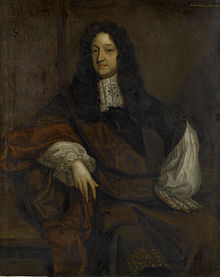Wikipedia
This text was copied from Wikipedia on 20 July 2024 at 6:10AM.

Sir Edward Dering, 2nd Baronet (8 or 12 November 1625 – 24 June 1684) of Surrenden Dering, Pluckley, Kent was an English politician who sat in the House of Commons at various times between 1660 and 1674.
Life

Dering was the eldest surviving son and heir of Sir Edward Dering, 1st Baronet of Pluckley, Kent by his second marriage to Anne, sister of John Ashburnham. He was educated at Heathfield in 1632, Cripplegate, London under Thomas Farnaby in 1633, Throwley under Mr Craig from 1634 to 1637, and Woodford under Mr Copping from 1637 to 1639.[1] He was admitted as a fellow-commoner to Sidney Sussex College, Cambridge in 1640[2] and transferred to Emmanuel College, Cambridge in 1642 and was awarded BA in 1643. In 1644 he entered Middle Temple. He was 18 at the death of his father, who left a widow and several young children in 1644. He went to Leyden in 1644 and travelled abroad in the Netherlands and France until 1646.[1]
In April 1660 Dering was elected Member of Parliament for Kent in the Convention Parliament. He was appointed one of the six commissioners for executing the Irish Act of Settlement 1662 in July 1662 and was returned to the Irish House of Commons as Member of Parliament for Lisburn. In 1670 he was elected MP for East Retford in a by-election to the Cavalier Parliament. He was elected MP for Hythe in the two elections of 1679 and in 1681. He was also appointed a commissioner of the Treasury in 1679.[1]
Dering died in London aged 58 and was buried at Pluckley.
Family
Dering married Mary Harvey, daughter of Daniel Harvey (a brother of Dr William Harvey) by Elizabeth, daughter of Henry Kynnersley on 5 April 1648.[3] They had 17 children, of whom 10 survived to adulthood. He was succeeded in his estates and title by his son Sir Edward Dering, 3rd Baronet. Among the other children, Elizabeth was married to Sir Robert Southwell, by whom she is ancestral to Camilla, Duchess of Cornwall;[4] Catherine to Sir John Perceval, 3rd Baronet, by whom she was the mother of John Perceval, 1st Earl of Egmont; Daniel, an Army officer, to Sir John's sister Helena Perceval; and Mary to Sir Thomas Knatchbull, 3rd Baronet.[5]
See also
References
- ^ a b c History of Parliament Online – Dering, Edward
- ^ "Dering, Edward (DRN639E)". A Cambridge Alumni Database. University of Cambridge.
- ^ G.E.C. [Cokayne, George Edward] (1900-6): The Complete Baronetage. Exeter: William Pollard & Co.
- ^ William Addams Reitwiesner. "Ancestry of Duchess of Cornwall".
- ^ Haslewood, Rev. Francis (1876): Genealogical Memoranda of the Family of Dering. London.
1 Annotation
Second Reading
San Diego Sarah • Link
The Diary years:
Sir Edward Dering, 2nd Bart.,’s father died in financial straits, and with his large family, Dering was always eager for office to reduce his debt. Nevertheless he ‘most carefully and resolutely refused, during the time of the usurped power, all manner of public employment’.
When George Monck declared for a free Parliament, Dering seized ‘the first opportunity since the last King’s death of doing service to my country ... went down to Kent and declared to stand for knight of the shire’.
He was returned after a contest, and became a moderately active Member of the Convention. He was appointed to 26 committees, including that to prepare the bill for abolishing the court of wards. ... Dering was promptly added to the committees for the bill restoring the dukedom of Somerset and for the Winchilsea estate bill.
Shortly thereafter Winchilsea wrote that Dering had been ‘very industrious in assisting me upon all occasions to serve his Majesty before the King came into England’ praised his work as deputy lieutenant and ‘in all other things which concerned his Majesty’s service.’
After the recess Dering was added to the committees to bring in the militia bill and the bill for modified episcopacy.
Dering did not stand in 1661, ‘thinking of nothing more than settling myself quietly at home to govern my small fortune and many children as well as I could’.
He was not allowed to rusticate for long, being appointed in July 1662 one of the six commissioners for executing the Act of Settlement in Ireland.
He was returned to the Dublin Parliament for Lismore, and won the respect of the lord lieutenant, the Duke of Ormonde, as a ‘loyal servant’ who was also ‘knowing and able in business’.
By 1665 Dering's sights were again set on a seat at Westminster. Sir Robert Southwell asked Sir Thomas Peyton to let him know of any vacancy in Kent or the Cinque Ports, ‘so that his father-in-law, Sir Edward Dering, a man of talent, might serve his Majesty in the House of Commons’.
He was proposed for Winchelsea, but the Duke of York preferred to nominate Baptist May.
When the Irish claims commission was wound up in 1669, Dering returned to England as a commissioner of the privy seal.
He received the ‘court commendation’ for a seat at East Retford, where he was ‘totally a stranger’ and was unanimously elected on the Duke of Newcastle’s interest.
Dering was an active Member of the Cavalier Parliament, being named to 207 committees, in eight of which he took the chair. Over 60 of his speeches were recorded, the first being on 5 Apr. 1671 when, in the debate on the third reading of the conventicles bill, he argued that the bill would ‘involve the justices in many inconveniences’. ...
https://www.historyofparliamenton…